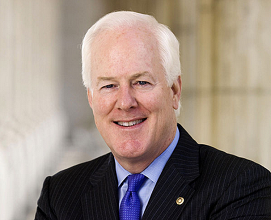Cornyn Probes White House Role in FCC Set-Top Push
The smarter way to stay on top of the multichannel video marketplace. Sign up below.
You are now subscribed
Your newsletter sign-up was successful

Texas Republican Senator and Majority Whip John Cornyn has problems with the way the FCC's set-top box proposal came down and what role the White House had in that, and other, FCC decisions.
In letters to White House counsel Neil Eggleston and FCC Chairman Tom Wheeler this week, Cornyn presumed the White House had been directing the outcome of the proceedings of the FCC, an independent agency, and wanted information about how that was happening.
Cornyn said in the letters, which were identical, that he was troubled by "claims that Administration officials are inappropriately pressuring an independent agency to pick winners and losers in the marketplace.
FCC Republicans have raised the same concerns, as has National Cable & Telecommunications Association President Michael Powell, who told Multichannel News/B&C last month that "calling on the commission to take a specific action with that much specificity really takes advantage of the enormous coercive power of the presidency to put commissioners, particularly those in the President’s party, in a highly uncomfortable and difficult position.."
The President publicly urged the FCC to "unlock" set-top boxes after the FCC voted to propose the move, as he had publicly called for Title II reclassification of ISPs, though that public call came before the FCC pivoted to that position.
Cornyn cited that Title II input from the White House as well, pointing to a Governmental Affairs Committee investigation that concluded, Cornyn said, that the White House "overrode the FCC's normal decisionmaking apparatus in order to engineer an outcome for regulating the Internet."
Cornyn wants all records of communications between the Executive Office of the President and anyone at the FCC on the set-top issue, as well as various other travel records, phone records (including VoIP records), logs and other data, and he wants them by May 26 at the latest.
The smarter way to stay on top of the multichannel video marketplace. Sign up below.
Contributing editor John Eggerton has been an editor and/or writer on media regulation, legislation and policy for over four decades, including covering the FCC, FTC, Congress, the major media trade associations, and the federal courts. In addition to Multichannel News and Broadcasting + Cable, his work has appeared in Radio World, TV Technology, TV Fax, This Week in Consumer Electronics, Variety and the Encyclopedia Britannica.

